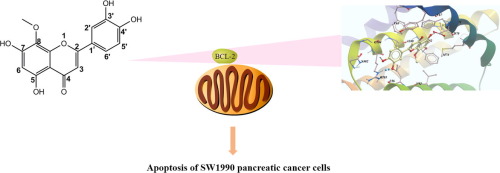Bioorganic Chemistry ( IF 4.5 ) Pub Date : 2018-02-02 , DOI: 10.1016/j.bioorg.2018.01.042 Yiwen Zhang , Zhimei Li , Qiuxia Min , Abulizi Palida , Yiyuan Zhang , Ruotian Tang , Lixia Chen , Hua Li

|
8-Chrysoeriol, a bioactive flavanoid, was firstly identified to bind directly to BCL-2 as BH3 mimetics by structure-based virtual ligand screening. And 3D docking model revealed the molecular basis of 8-Chrysoeriol targeting to BCL-2. The interaction between 8-Chrysoeriol and BCL-2 was further confirmed using Microscale Thermophoresis (MST) technique. Meanwhile, high expression level of antiapoptotic protein BCL-2 was detected in SW1990 pancreatic cancer cells and 8-Chrysoeriol showed obvious proapoptosis effect against SW1990 in vitro. Collectively, the results showed that 8-Chrysoeriol as a natural dietary product potentially targeting to BCL-2 could serve as a lead compound for SW1990 pancreatic cancer therapy.
中文翻译:

8-Chrysoeriol,作为潜在的BCL-2抑制剂可触发SW1990胰腺癌细胞的凋亡
通过基于结构的虚拟配体筛选,首先鉴定出8-Chrysoeriol,一种生物活性类黄酮,可以直接结合BCL-2作为BH3模拟物。3D对接模型揭示了8-Chrysoeriol靶向BCL-2的分子基础。使用Microscale Thermophoresis(MST)技术进一步证实了8-Chrysoeriol与BCL-2之间的相互作用。同时,在SW1990胰腺癌细胞中检测到了抗凋亡蛋白BCL-2的高表达水平,而8-Chrysoeriol在体外对SW1990具有明显的促凋亡作用。总的来说,结果表明8-胆固醇作为一种天然饮食产品,可能靶向BCL-2,可以作为SW1990胰腺癌治疗的先导化合物。





















































 京公网安备 11010802027423号
京公网安备 11010802027423号